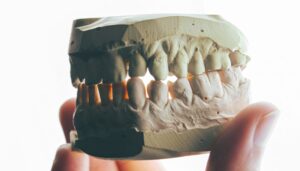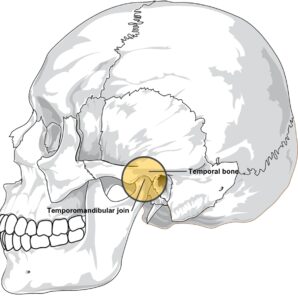Posted on Sunday, October 31st, 2021 | 1,299 views
 Approximately 10 percent of adults unconsciously grind their teeth while they sleep and approximately one in three adults do when they’re awake. The medical term for this tendency: bruxism.
Approximately 10 percent of adults unconsciously grind their teeth while they sleep and approximately one in three adults do when they’re awake. The medical term for this tendency: bruxism.
Do you frequently grind your teeth during the day? If so, read on to find out why, and what you can to do to fix the problem.
The Problem with Frequent Teeth Grinding
Occasional teeth grinding is not harmful but grinding your teeth on a regular basis is a sign of a problem. Over time, teeth grinding can lead to serious issues including TMD (Temporo Mandibular disorders) and other jaw problems.
TMD affects the temporomandibular joints (TMJ). TMJ is the joint that connects the lower jaw to the skull’s two temporal bones. If there’s ongoing strain on temporomandibular joints the end result can be a TMJ disorder, as mentioned also known as TMD.
 TMD can be temporary or long term, and it often involves unpleasant symptoms such as the following:
TMD can be temporary or long term, and it often involves unpleasant symptoms such as the following:
- Jaw soreness or tenderness.
- Jaws momentarily locking into place (lock-jaw).
- Facial/cheek swelling.
- Popping sounds that accompany jaw movement.
- Occasional dizziness.
- Ringing in the ears.
If you grind your teeth you can speak to your dentist about TMJ, before your symptoms worsen.
Is Teeth Grinding A Signs of TMD?
What Happens When You Grind Your Teeth?
There’s an extensive list of dental issues associated with bruxism. They include:
- Damaged and broken teeth.
- Damaged dental work.
- Worn-out enamel.
- Loose teeth.
- Lost teeth.
- Teeth that are worn down to stubs.
To treat such conditions patients may require procedures like root canals, dental implants, crowns, partial dentures, or complete dentures, among other treatments.
Grinding teeth can also induce earaches, headaches, migraines, chewing problems and jaw pain. In particular it can cause TMJ soreness.
Why Do People Grind Their Teeth?
 Numerous conditions and factors exist that can bring about this problem.
Numerous conditions and factors exist that can bring about this problem.
Awake Bruxism
Awake bruxism is often caused by hyperactivity, anxiety, or stress. Genetics can play a role, too. Children are more likely to grind their teeth if one of their parents did.
Sleep Bruxism
Sleep bruxism can be a symptom of an underlying medical condition like sleep apnea and other sleep disorders that interfere with breathing. In such cases your brain tries to wake you up by grinding your teeth so your normal breathing patterns can resume.
When teeth are missing or misaligned, it can likewise lead to sleep bruxism.
What Treatments Are Available?
The ideal medical or natural treatment for your bruxism depends on its underlying cause but you can try the following:
- You can do TMJ jaw exercises.
- Find ways of reducing stress.
- Gently massage your jaws and facial muscles.
- Speak with your dentist.
- Consider having Botox injections.
- Ask your dentist about mouth guards.
- Research homeopathic remedies.
Of course, lowering your stress levels can boost your health in numerous other ways too. You can speak to your physician about stress reduction. You can practice medication or yoga, or practice exercises that promote peace of mind and stress relief.
Likewise, a counsellor, a physical therapist, or even a massage therapist can be helpful in this pursuit.
Sleep Disorders and Teeth Grinding
If a sleep disorder causes you to grind your teeth, addressing them will also address your bruxism. Your doctor will have a number of sleep disorder treatment options to choose from, including surgical operations, medications, and breathing apparatuses.
Teeth Grinding as a Habit – How to Stop It
What if your bruxism isn’t related to stress or a sleep disorder? What if it just seems to be a habit that you’ve picked up? Well, several types of treatment are available for such a case.
For example, your dentist might suggest that you wear a mouthguard when you sleep—one that’s moulded to the shape of your teeth. Mouth guards are meant to protect your teeth from injury but when worn at night can ease the behaviour associated with Bruxism. Your dentist can prescribe a custom fitted mouth guard or you can purchase one over the counter at your local drug store.
You could try to change some of your daily routines or behaviours. For starters, you might reduce or eliminate your intake of caffeine, sugar, and alcohol. You could avoid chewing things like plastic straws, toothpicks, pencils, or your fingernails.
If you grind your teeth while you’re awake, try resting your tongue’s tip between your teeth. Yes, it could be uncomfortable at first, but at least you won’t grind your teeth. And, after a while, you might break the habit.
Moreover, when you’re in a deep sleep, you’re less likely to grind your teeth. With that in mind, do whatever you can to improve the quality of your sleep. The following steps can be especially helpful:
- Go to bed and get up at the same time every day.
- Try to reduce your screen time during the hour before you go to sleep.
- Make sure you have a dark and quiet bedroom.
- Make sure you’re sleeping in a comfortable bed.
- Get plenty of exercise each day.
- Up your intake of magnesium and calcium.
After reading the information in this article, you may have concluded that you suffer from night bruxism. Perhaps you’re now realizing that you often grind your teeth when you’re wide awake too. Maybe you were even grinding your teeth while you were reading this article.
If you’re concerned about bruxism, talk to your dentist as soon as you can. Your dentist will help put together a personalized plan of action. Before long, you should only be using your teeth to chew your meals and snacks.
Read More...
About Dr. Pio Modi
After Dr. Modi graduated from McMaster University with an Honours B.Sc. in chemistry in 1997, he received his Doctorate of Dental Surgery from the University of Toronto in 2001. He began to practice dentistry in Brantford the following year. Throughout his career he's completed hundreds of hours of continuing education programs and has studied with some of the best educators in the industry.
Leave a Reply